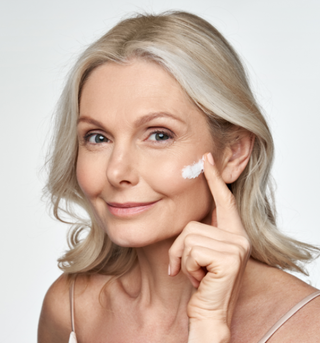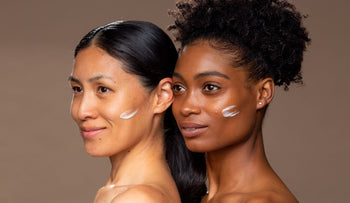The health of your skin is often a reflection of how you treat the rest of you. For instance, if you aren’t drinking enough water, not only will your body become dehydrated, but your skin will, too. By learning the causes of dehydration, paying attention to its signs, and adopting a regular skincare routine suited for your skin concerns, you can restore a healthy balance in your skin – and it will show in your complexion.
Differences between dehydrated and dry skin
The common signs and symptoms of dehydrated skin are itchiness and loss of elasticity, but aside from that, these two skin issues have fairly different characteristics.
The term “dry skin” is a skin type. You may have dry skin when your skin’s sebaceous glands don’t regularly produce enough natural oils. It can show on your complexion as scaliness and white flakes, with possible redness and irritation.

Dehydrated skin, however, is classified as a temporary skin condition and is due to a lack of hydration or water in the body. The signs and symptoms of dehydrated skin are as follows:
Dullness
Skin lacking in moisture will soon begin to appear dull, and your overall complexion may appear uneven.
Itchiness
As the skin dries out and becomes dehydrated, it can feel itchy or tingly.
Darker under-eye circles
When your body isn’t getting enough water, the thinner skin below and around your eyes will begin to appear darker and sunken.
What causes dehydrated skin?
Dehydrated skin on the face is caused by several different factors. It’s important to identify the causes so that you can treat the problem.
Not drinking enough water
The most common cause of dehydrated skin is simple: not drinking enough water. Dehydration is often accompanied by additional symptoms such as tiredness and headaches. As a general rule, you should drink one ounce of water for every pound in body weight. If you weigh 150 lbs., aim to drink 150 oz. of water throughout your day.
Environmental factors
The world around you can affect the quality and behaviors of your skin. Factors such as pollution and cold weather can dry out your skin. You can defend against environmental dehydration with a skincare regimen suited for your skin type and personal skin concerns. Most important are a suitable moisturizer and daily sunscreen.
Caffeine, alcohol and cigarettes
Caffeine, nicotine, and alcohol are all diuretics. They remove fluids from your blood through the renal system at a much quicker rate than your body is able to compensate for.
Lack of sleep
As you sleep, you naturally perspire more to rebalance your body’s hydration levels. This extra perspiration acts as a natural moisturizer that hydrates and plumps the skin. If you’re not getting enough beauty sleep each night, it can result in dehydrated skin.
How to prevent dehydrated skin
Once you’ve worked out the underlying cause or causes for your dehydrated skin, you can plan for how to prevent it from happening in the first place. Here are some things you can do to keep your skin healthy and hydrated:

Stay hydrated
Ultimately, dehydrated skin is a result of the body's lack of water, so it’s important to make sure that you’re drinking enough, particularly during situations and activities that cause you to sweat more, including exercise. A sports drink containing electrolytes can also help boost hydration levels. As a general rule, you should drink one ounce of water for every pound in body weight. If you weigh 150 lbs., aim to drink 150 oz. of water throughout your day.
Protect your skin from environmental factors
While it’s impossible to avoid certain factors, such as cold weather and pollution, in your day-to-day life, there are steps you can take to protect your skin. As soon as you arrive home, remove any makeup and cleanse your skin to prevent any pollutants from becoming embedded in your pores. Following a good skin care regimen will also help to protect your skin from the environment.
Limit caffeine, alcohol , and cigarettes
Stopping smoking, limiting alcohol intake, and switching your morning coffee for a cup of tea instead can all help to prevent dehydrated skin.
Get plenty of sleep
Try to get between seven and nine hours of sleep each night. If you struggle to fall asleep, it can help to go to bed and wake up at the same time each day. Listen to soothing music, imagine a relaxing scene, inhale, and exhale slowly multiple times to release any tension. Also, try to put down electrical devices like your phone or tablet as blue light exposure can deplete melatonin levels in the body, making it more difficult to fall asleep.
Use hydrating skincare products
Following the above steps will help treat your skin from the inside out, but if your skin is still in need of hydration, consider treating it with hydrating skincare products rich in humectants like hyaluronic acid, glycerin and aloe. Explore our hydrate and plump hyaluronic acid range, which will give you plump, smooth, and firmer-looking skin, instantly and over time.
Consider following our step-by-step dehydrated skin regimen below.
Dehydrated skin regimen
1. Cleanse
Begin with a cleanser such as our Barrier Renew Gel-to-Foam Cleanser to create a clear base so that the subsequent products in your regimen absorb more easily. Using the right cleanser makes all the difference, so be sure to choose one that doesn’t dry out or damage your skin’s moisture barrier.
2. Apply eye cream
Once your skin is clean, apply an eye cream like our Hydrate & Plump Eye Cream to ideally hydrate and plump the skin around your eyes.
3. Utilize a serum
Serums containing hyaluronic acid like our Hydrate & Plump Serum Capsules work by drawing moisture from the air and from within skin up to the surface for maximum hydration. Apply the serum to your face in a tapping motion using your fingertips.
4. Use SPF
When your skin is exposed to UV rays without protection, the rays can easily damage your skin cells. It's important to use a daily SPF moisturizer like our Hydrate & Plump Moisturizer With SPF 30. It hydrates like a moisturizer and protects like a sunscreen while plumping away fine lines and wrinkles.
Dehydrated skin can easily be treated once the underlying cause has been addressed. You can discover more skincare tips and advice on our blog, or read more about the causes of dry skin and how to treat it.







